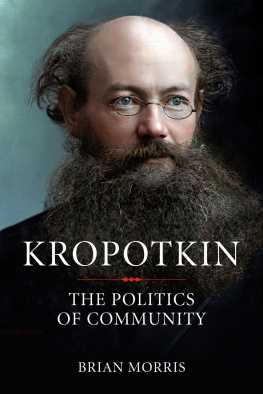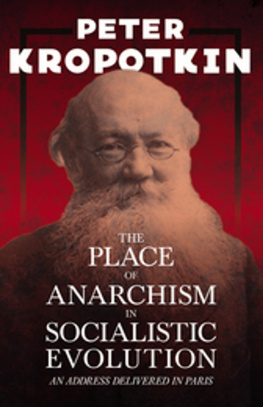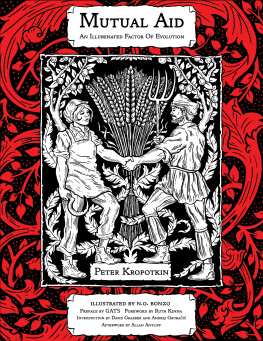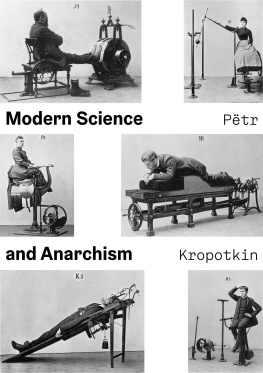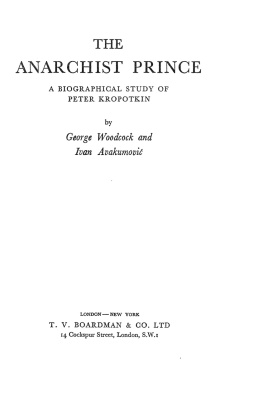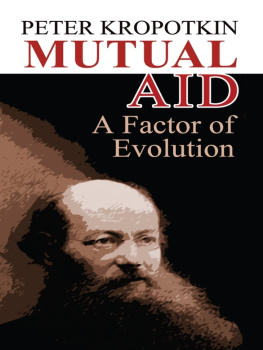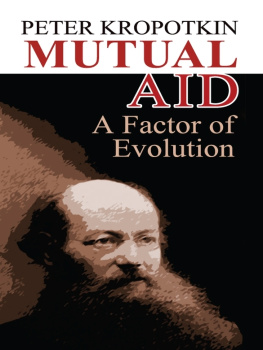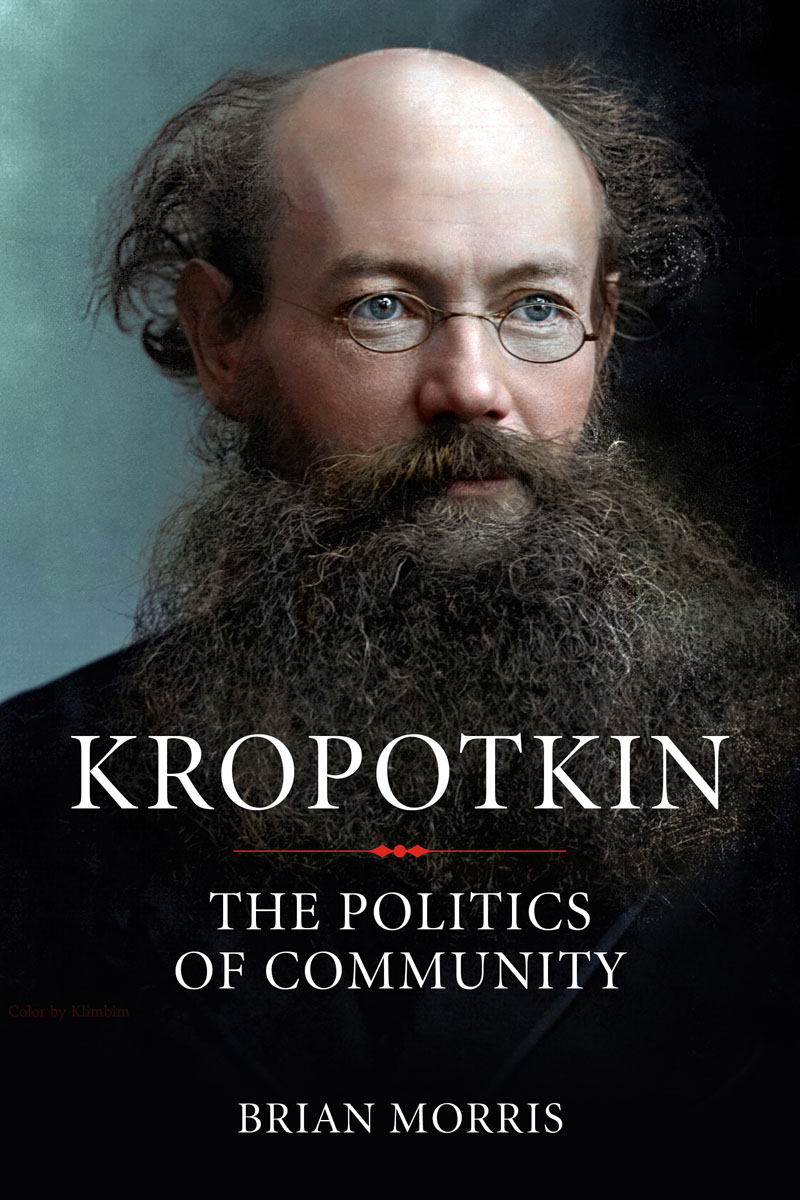

Kropotkin: The Politics of Community
Brian Morris
Brian Morris 2004
This edition 2018 PM Press
All rights reserved. No part of this book may be transmitted by any means without permission in writing from the publisher.
ISBN: 978-1-62963-505-7
Library of Congress Control Number: 2017964731
Cover by John Yates / www.stealworks.com
Interior design by briandesign
10 9 8 7 6 5 4 3 2 1
PM Press
PO Box 23912
Oakland, CA 94623
www.pmpress.org
Printed in the USA by the Employee Owners of Thomson-Shore in Dexter, Michigan.
www.thomsonshore.com
TO MY LIFELONG FRIENDS
PETER AND JOYCE SHARP
Everything that needs to be said has already been said. But since no one was listening, everything must be said again.
Andre Gide (Ehrlich 1996)
The crackpots, faddists, and terrorists have always given anarchism a bad name and they are still with us today.
Sam Dolgoff (Avrich 1995, 231)
CONTENTS

PREFACE

I have been interested in the life and work of Peter Kropotkin ever since I read his Appeal to the Young more than half a century ago. But the writing of the present text, intended as a critical introduction to Kropotkins social ecology and revolutionary anarchism, was specifically prompted by two concerns.
The first was personal, for in a review of my book Ecology and Anarchism (Images, 1996), which was a collection of various articles and reviews, Graham Purchase had chided me for not exploring the ideas of Kropotkin, although Kropotkin always hovered in the background of my writings. I thought I owed the anarchist-geographer some serious thought.
Second, toward the end of the last century, there were many books pouring off the academic press purporting to be about philosophers of ecology. These books not only completely ignored Kropotkin but even alluded to such iconic figures as Martin Heidegger, Jrgen Habermas, and Anthony Giddens, who were seminal scholars but were not, by any stretch of the imagination, ecological thinkers. But even when academic scholars seriously engaged with Kropotkin, they invariably depicted him as a crude positivist or as a Cartesian mechanistic philosopher. On the contrary, Kropotkin, drawing on the insights of Humboldt, Darwin, and his friend lise Reclusas I explore in this bookwas fundamentally an evolutionary naturalist. Apart from a few notable exceptions, academic scholars derided Kropotkins anarchism, deeming it unrealistic and contrary to either common sense or human natureone liberal political theorist even suggesting that Kropotkin lived in a veritable fairyland.
In addition, what also troubled me as the twentieth century drew to a close was that even anarchists began to dismiss his writings as historical baggage that needed to be jettisoned or at least given a major overhaul. Embracing, often with unwarranted enthusiasm, such contemporary fads as neoprimitivism, Nietzschean aesthetics, misanthropic bourgeois individualism (as Kropotkin had earlier described it), and esoteric postmodernist theoryas expressed, for example, in the pages of Freedom or the Green Anarchistmany of these critics of Kropotkin arrogantly rejected his intellectual legacy as obsolete.
In an earlier decade I had written a short introduction to the life and work of Mikhail Bakunin (Black Rose Books, 1993), defending his political integrity against his liberal and Marxist detractors, and I was similarly motivated to write the present book to defend and uphold both the importance and the contemporary relevance of Kropotkins legacy. As with my other writings, I have tried to keep the text free of academic pretension and jargon and to write in a style that is lucid and readable, and thus of interest to scholars, students, and radical activists alike, as well as to the general reader.
During the last decade, however, in the wake of antiglobalization demonstrations and the rise of the Occupy movement in many major cities and the Democracy Project (in its various guises), there has been a resurgence of interest in the life and work of Kropotkin. He is no longer thought of as an intellectual crackpot, and we have thus seen a plethora of essays and books exploring various aspects of his legacy. Kropotkins seminal role with regard to the anarchist roots of geography has been reaffirmed, particularly his status as a pioneer earth scientist and as one of the first scholars to explore the critical importance of climate change in the earths history. It is significant that Kropotkins portrait hangs in the library of the Royal Geographical Society in London.
Equally important, contemporary studies continue to reinforce the value of Kropotkins political writingsspecifically those on the social, historical, scientific, and philosophical basis of the anarchist movement. For in an important sense, Kropotkins anarchism was ecological, socialist, and libertarian, as the present book seeks to demonstrate. Kropotkin has even been interpreted as a major critic of classical anarchisma rather banal and meaningless concept invented and propagated by liberal academics.
But what has been of particular significance since the present book first appeared (in 2004) has been the publication of Iain McKays anthology of Kropotkins political writings, Direct Action Against Capital (AK Press, 2014). For what the anthology amply demonstrates is that Kropotkin was not a starry-eyed saint, completely lost in utopian dreams, but rather a practical thinker, actively involved in the economic and political struggles of the late nineteenth century. As a revolutionary anarchist Kropotkin was deeply opposed to capitalism and the state, as well as all forms of social oppression, while envisaging in concrete terms an alternative form of society based on mutual aid, voluntary associations, and communal self-management. But as a social ecologist, Kropotkin also envisaged reconciliation and a relation of mutual cooperation, between humans and the natural world, specifically other life forms. It is Kropotkins vision of an ecological society based on free communism, and his wider political and philosophical legacy, that this book aims to present.
Brian Morris
May 2017
LIST OF ABBREVIATIONS

T he following abbreviations appear in citations throughout this book. They refer to works listed in the first section of the bibliography, Kropotkins Works in English.
AY: | Act for Yourselves |
CB: | The Conquest of Bread |
E: | Ethics: Origin and Development |
EE: | Evolution and Environment |
FFW: | Fields, Factories and Workshops |
Next page
